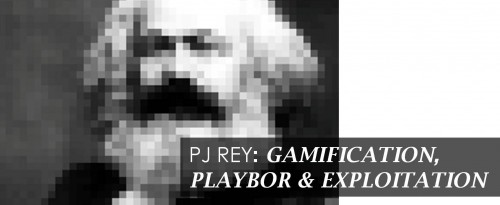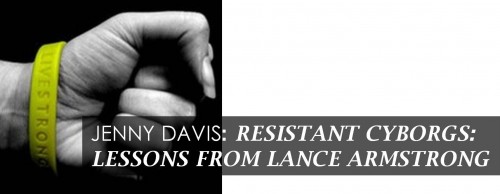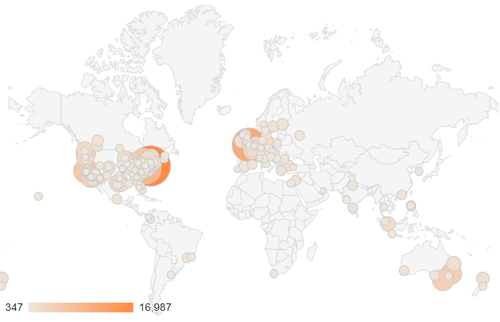Cyborgology launched two years ago today [see the first post], and we have a little birthday party post today. Below you will find lists of the most popular articles generated over the past twelve months since our first birthday. But first, we’d like to let each Cyborgology Editor highlight one post they wrote in the past twelve months, and say a little something about that post, where it went after being published, and a little about blogging itself. Click the images to read the posts!
Nathan: It’s fun to watch how Cyborgology evolves, situated within different interpersonal, professional, academic, journalistic, and other media ecosystems. PJ Rey and I started this site two years ago today and it has become important for everyday work, be it thinking through ideas for my dissertation, communicating with other media outlets, or just a place to read and write and comment on the stuff that interests me. Blog posts here sometimes end up as presentations at Theorizing the Web, academic papers, essays in other outlets, news media appearances, etc.
Thinking of one post I wrote this past year for Cyborgology, I might go to the one that drew the most hits/comments, on Pinterest and Feminism; the most fun was an Occupy Photo Essay; the most “correct” was probably my prediction that Occupy would not endure without encampments. And this piece was the starting ground for what turned into my IRL Fetish essay that eventually landed in The New York Times. But the one I want to highlight here is the one that first sprang to mind when thinking back over the past year: How Academics Can Become Relevant. In the piece, I discuss what I don’t like about academia, but, mostly, it is a personal reflection, an outline for the type of thinker I want to be. It’s the job I want to have. Can I be an academic that thinks in public in a way that the public wants to hear? I have a long way to go, and sometimes it feels impossible, but having this roadmap keeps me at it.
PJ: My most successful posts seem to fall into two categories: quick reaction pieces to news/observations and inquiry piece where solicit feedback on a topic that I’m trying to theorize. While my Hipsters and Low-Tech piece had the greatest reach, I’m most excited about my recent Gamification, Playbor & Exploitation essay, which proved to be a launching point for some of the most productive conversations I’ve had all year. I wrote this piece as an initial sketch of some ideas I had for a book chapter and encouraged readers to respond either on the Cyborgology site or via Twitter. This led to a series of extremely fruitful conversations with games studies experts, including Mark Nelson, Evan Selinger, and Sebastian Deterding, that helped me frame and develop my chapter. One thing that this experience highlights is the close connection that this blog has with the Twitter presence of our authors. In fact, I think it is safe to say that most of the Web-based communication that happens within the community of Cybogology readers and contributors is occurring on Twitter. We like it this way. Our daily Twitter dialogue is often the starting point for posts which then feed right back into that dialogue. I think this cycle of conversation is a central factor behind the timeliness and quality of posts on the Cyborology Blog.

David: The posts that I spend the most time on almost always fall flat. I think I’m most proud of the conclusions in my least-popular post: “On the Flow of Tweets.” Social media companies have become huge transnational corporations and their influence on states’ censorship policies is a severely under-theorized subject matter. I was hoping it would get people talking about the sociotechnical hierarchies of the Internet and how it disrupts existing nation states. “On the Flow of Tweets” came right on the heals of my most popular post of the year: “Sherlock: A Perspective on Technology and Story Telling” was (and still is) featured on the BBC One’s show page. The conclusions are a lot less interesting but, to be brutally honest with myself, I would rather read that post than “On the Flow of Tweets.” These two posts represent the polar opposites of my writing styles (I guess I was feeling particularly bipolar in February) and my personal project for the year has been trying to meld these two styles. True mastery of a subject is the ability to describe complex ideas in clear language. Writing for Cyborgology has pushed me to be more concise and clear and not a week goes by that I don’t recommend the practice to fellow young scholars. If I could do it over, I would try to write “On the Flow of Tweets” in the style of “Sherlock”. I might lose some nuance and some badly needed theory, but the general premise would reach much more people. The social sciences are changing dramatically and the one thing that seems clear at the moment is that we need to make our most useful ideas known to the largest amount of people. Encouraging social scientists to become public intellectuals will go a long way in demonstrating the utility of the social sciences, advertising our achievements and justifying our continued existence to the world.
Whitney: Writing about white flight and App.net was an impulse; it wasn’t my day to post, and I’d already put up the full essay version of my “A New Privacy” piece (my other favorite post from this year) earlier that week. But my fledgling blog-flavor ‘documentary vision’ kicked in as I started to text a friend with my take on App.net’s initial $50 membership fee: Wait…should I maybe write about this? So instead of sending a text message I spent the day at my computer, and sent the post live just before heading out to meet a friend for dinner. It was a Thursday evening; since I know Friday is one of Cyborgology’s slower traffic days, I didn’t expect the post would get much attention until Monday.
This post was my personal crash-course not only in blogging’s potential impact and influence, but also in how quickly blogging can spark broader conversations. Far from lying dormant until after the weekend, the App.net piece sparked a flurry of phone-buzzing @replies throughout dinner—which wasn’t at all what I’d expected! By Friday morning BuzzFeed had asked to repost the piece, and pingbacks showed other outlets were reposting it as well. The following Tuesday I discussed the post in my first-ever live media appearance (on HuffPost Live) and as a guest on a podcast (On The Grid); the post was also mentioned a month later on the Canadian Broadcasting Corporation’s show Spark. I’m still both humbled and amazed by how writing for Cyborgology could transform one of my random observations into (what I think are) important discussions about race, privilege, and social media.
Jenny: I want to begin by thanking Nathan and P.J. for putting together the Cyborgology Blog project. I am still humbled to be a part of it, and to get to write alongside such creative and talented minds. Truth be told, my favorite posts are the ones written by my fellow cyborgologists, from whom I continue to learn on a regular basis. From my own post repository, however, my favorite essay of the year is “Resistant Cyborgs: Lessons from Lance Armstrong.” This post flowed easily for me, and was a moment of clarity and articulation of issues I had been grappling with in not quite coherent ways for some time. It felt like I had finally spit out a slew of disparate musings on the intersection of bodies, technologies, identity, and morality, and that somehow, the words landed in a meaningful order upon the page. Moreover, this was an opportunity to enter into direct dialogue with Alva Noë (@alvanoe), a scholar and writer whose work I very much admire. Finally, the post sparked great conversation and debate within the comments section, on Twitter, and through personal emails. These conversations pushed my thinking, and, I hope, pushed readers’ thoughts as well.
Sarah: Like pretty much everything I write here, my essay on atemporality and “ruin porn” was me fumbling around in the dark, catching hold of separate ideas that I found interesting and trying to see how and where they met. The result was far more interesting than I really expected it to be going in, and thankfully others seem to have found it interesting as well. In addition, it spawned all my other posts on ruined and abandoned places that followed, each of which was like discovering some new area of what I thought was well-explored ground. Writing the post itself – exploring my own understanding of what time is, and what it means to both think and be within a space of ruin – was a process of discovery. Like all of the best posts, I came out of it knowing a great deal more than I did going in.
Like many people, I’m fascinated by death – by its implications almost more than the thing itself. What does it mean to be gone? Who remembers us and how? What does it mean if no one remembers us at all? What does imagining a future without us mean for our understanding of ourselves as beings both temporal and mortal? We all ask these questions, I think. I’ve been asking them for years. But with this essay, they took on a new solidity in my mind; I was able to grapple with them in a way I hadn’t before. I’m not sure I found many answers, but often asking the questions in certain ways is more important. Those questions haunt, like ghosts. Like abandoned spaces, we live with them all around us. This is one of the things for which I’m most grateful regarding writing for Cyborgology: a space to articulate these questions, to debate and explore them in a way that’s frankly difficult in many other corners of academia. For two years that’s been true. Here’s to years more of the same.
***
The posts made between October 2011 – 2012 that received the most page views were:
3. Race, Class, App.net: The Beginning of ‘White Flight’ from Facebook & Twitter?
4. Sherlock: A Perspective on Technology and Story Telling
5. The Atemporality of “Ruin Porn” – Part I: The Carcass
6. The Popularization of Dubstep: FULL ESSAY (Parts 1 and 2)
7. The Crisis of Authenticity: Symbolic Violence, Memes, Identity
8. Sherry Turkle’s Chronic Digital Dualism Problem
9. Robot Fetishism, Synthetic Partners, and Phallogocentrism
10. Gender, Culture, and Cooking on the Internet
The most commented on posts from October 2011 – 2012 were:
1. Race, Class, App.net: The Beginning of ‘White Flight’ from Facebook & Twitter?
2. Why Do We Use Spatial Metaphors to Talk about the Web?
4. ‘Salientification, Explicitization, Deobscuration’: Looking for Less-Awkward Words
5. Sherry Turkle’s Chronic Digital Dualism Problem
6. The Data Self (A Dialectic)
7. Experiencing Life Through the Logic of Facebook
9. Trust and Complex Technology: The Cyborg’s Modern Bargain
10. Refusing the Refusenicks Paradigm
In the past year, 55% of our traffic comes from the US, 16% from continental Europe, 8% from the UK, 7% from Canada.








Comments 2
Javier de Vega — October 26, 2012
Congratulations you all! One of the top blogs among my favorites, seriously. Thanks, and best regards from Spain. Javier
SAA — October 26, 2012
Congratulations!